
Society’s current obsession with gender identity politics is unprecedented and if there’s one thing we can probably all agree on, it’s that there needs to be more research done into why more and more young people are increasingly identifying as transgender and the best way to help them.
So when we see studies springing up that purport to delve into these issues, it seems rational to be reassured. But how objective are these studies? How are they sourcing their participants? Who are the researchers and what is their background? And where is all this money coming from?
Currently, an interesting project is taking place at the UK’s ‘top ranked and largest centre for academic primary care’, the Nuffield Department of Care Primary Health Sciences at Oxford University. The NDCPHS’s aim is to use ‘research and training to rethink the way health care is delivered in general practice and across the community.’
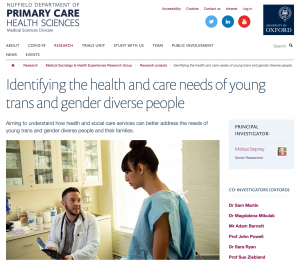
The 30 month project, named ‘Identifying the health and care needs of young trans and gender diverse people‘ aims to improve our understanding of ‘young gender diverse peoples’ experience’ as well as look at the perspectives of their families and the health professionals that work with them, with a view to improving ‘the care and support of trans, gender diverse and gender questioning people, and their families’.
What is ‘gender diverse’?
Firstly, it might be a good idea to clarify the aims of the project. Perhaps a sensible place to start would be with a definition for the phrase ‘gender diverse’. We’ve all heard it, but nobody seems to be able to give a satisfactory definition of what it means. Even Stonewall, with its lengthy list of gendered terms and labels, doesn’t attempt to define it.
 Traditionally ‘gender diverse’ meant having an equal or balanced mix of the sexes in the workplace.
Traditionally ‘gender diverse’ meant having an equal or balanced mix of the sexes in the workplace.
‘Gender diversity is equitable or fair representation of people of different genders’ Wikipedia
Nowadays it more often refers to someone who doesn’t conform to society’s mainstream gendered expectations: so in theory a gender diverse child could be little more than a long-haired boy or a make-up free girl. It would certainly help to be more specific. After all:
![]()
What is this project about?
The project, when complete, plans to consist of 90 interviews with young people, their families and their healthcare professionals. It will also produce two sections for healthtalk.org, a website run in partnership with research groups at the University of Oxford. At healthtalk.org you can evidently ‘find out about what it’s like to live with a health condition, by watching other people share their stories’.
Full public details of the project are available here.
Before we examine the aims and funding of the project, lets have a quick look at some of the people involved.
Melissa Stepney 

Melissa Stepney
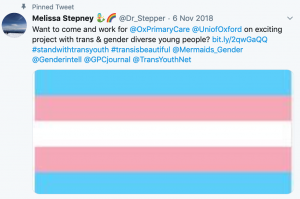
The project is led by Dr Melissa Stepney of the Nuffield Department of Primary Care Health Sciences and funded by the National Institute of Health Research.
Stepney sports both a rainbow and a mermaid in her twitter profile and tags both Mermaids and Gendered Intelligence in her tweets enlisting young people and their parents for this ‘exciting project with trans and gender diverse young people’.
Stepney appears to have no previous experience of research in this area: her ‘pubmed’ entry prior to June 2018 (when she received the award for this project) shows just two prior studies: one about how neurological illness affects driving and one about young women getting drunk. She had not held any research grants before winning this one. Spoiler – we’ll be coming to this later – this grant is for well over half a million pounds.
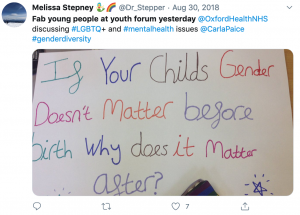 The project may be vague about defining ‘gender diversity’, but it seems that Melissa has problems defining ‘gender’ – or even comprehending the difference between sex and gender.
The project may be vague about defining ‘gender diversity’, but it seems that Melissa has problems defining ‘gender’ – or even comprehending the difference between sex and gender.
Melissa tweeted this ‘fab’ picture in 2018: “If your child’s gender doesn’t matter before birth why does it matter after?”
More recently she tweeted support for a petition to ‘stop rollbacks to safeguards for trans dignity and safety in this country’.

The petition was in response to Minister for Women and Equalities Liz Truss’s acknowledgement that “under-18s (should be) protected from decisions that they could make, that are irreversible in the future… it’s very important that while people are still developing their decision-making capabilities that we protect them from making those irreversible decisions.”
It seems fair enough to take from this that Stepney supports the medicalisation of trans-identified youth. It should be noted that nothing Truss said suggested anyone’s rights should be ‘rollbacked‘ or anyone’s dignity removed. You can read Truss’s full speech here.
Concerned that Stepney’s susceptibility to hyperbole and involvement in transactivism might affect her ability to run an objective study? We’re just on the edge of the rabbit hole. Buckle up.

Sam Martin

Sam Martin
One co-investigator on the project is Dr Sam Martin (left), who as part of his PhD founded the QueerVIBE project for 13-25 year olds. (Despite being set up a year ago, the project website remains unfinished, with links that lead nowhere and potential participants being informed that QueerVIBE is ‘currently amending materials and not accepting participants right now’.)
While studying part-time for a degree in Manchester, he reports, 28 year old Sam went to a mate’s drag party dressed up in ‘feminine clothes, shoes, make-up and wig’ and ‘something inside him awoke’. A liberating epiphany that men can wear what they like and still be men, perhaps? Evidently not: instead this was the moment of Sam’s realisation that he was ‘gender-fluid or non-binary’. Henceforth he wished to be addressed as ‘they/them and ‘Sam noticed prejudice everywhere they turned’.
At the end of a recent podcast Sam told listeners “Now I’m starting my kind of HRT journey.”
Martin has a master’s degree in Psychodynamic Counselling and Psychotherapy and a PhD in Psychology. The ‘parent fact sheet’ for the study states that any queries or complaints should be addressed to him.
Magdalena Mikulak

Magdalena Mikulak
The project also involves Magdalena Mikulak, who has a PhD in Gender Studies from the London School of Economics.
I have not met Martin, but my friend Gwen and I did meet Mikulak last year, when she was a speaker at the mind-mashing ‘What if the State no Longer Sexed Us?’ talk at Somerset House in London.
It should hardly need to be pointed out that the state does not sex us, biology sexes us, yet nonetheless, there we were.
The content of the lectures was so completely baffling that I never even started the article I’d planned to write about the event- I literally didn’t know where to begin. I gave Gwen my notes after she offered to do it, but she also abandoned the mission. You really had to be there to comprehend the depth of the woowoo.
I spoke to Mikulak afterwards and she was friendly and approachable. Yet she seemed unable, or possibly unwilling, to explain the difference between sex and gender: a disconcerting position for someone who makes a career out of lecturing on the subject.
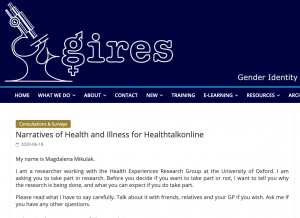
Mikulak, recruiting for study participants on the GIRES website
It was a fabulous location though, offering free post-lecture drinks and a luxury vegan buffet. I remember Gwen and I speculating afterwards as to how such a peculiarly nebulous free event had been able to procure sufficient funding to provide attendees with such a spectacular venue and such ambrosian sustenance.
Who else is involved?
 If you’re concerned that the above mentioned people may not be ideally objective researchers for such a study, there is a grain of hope. There are some grown ups in the room.
If you’re concerned that the above mentioned people may not be ideally objective researchers for such a study, there is a grain of hope. There are some grown ups in the room.
The project is secondly/jointly led by sociologist and anthropologist Dr Sara Ryan who ‘has extensive experience of working with seldom heard groups’. Ryan has neither rainbows nor pronouns in her Twitter bio and will be providing ‘mentorship and support at all stages’.
So she’s going to have her hands full.
Others involved in the project, according to the website, are academic public health physician and health services researcher John Powell and Adam Barnett CEO of the DIPex Charity which runs healthtalk.org (both who have been involved with projects on the receiving end of millions in funding) and medical sociologist Sue Ziebland.
All appear to be rainbow and pronoun-free.
So there we have the basis of the project. The interviews will be recorded and the result used to produce two sections for a website, including short videos. Key findings from the research will also be presented at a ‘national stakeholder event’. With refreshments, no doubt.
Why am I so certain there will be refreshments?
Because of the budget! This is a no ‘custard creams and Nescafé’ project, ma’am.

How is the project funded?
The project applied for funding to the National Institute of Health Research.
The NIHR works with the NHS, universities & local government and describes itself as ‘the nation’s largest funder of health and care research’ providing ‘the people, facilities and technology that enable research to thrive.’
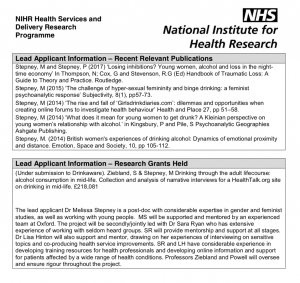
“The project will be secondly/jointly led with Dr Sara Ryan who has extensive experience of working with seldom heard groups.”
As we know, the main grant applicant was Melissa Stepney. Co-applicants included Dr Sarah Davidson of the Tavistock and Portman NHS Foundation Trust, (who did declare a potential conflict of interest) and Jay Stewart of Gendered Intelligence.
How do I know this, you ask?
I was emailed the documents last week, by someone deeply concerned about the quality of this research, who wishes to remain anonymous.
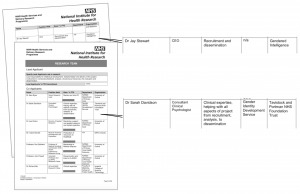
“Leaked documents?” mused Gwen with concern, when I told her. “Well it all sounds very exciting but be careful. One minute you’re feeling all important sharing secret documents, the next you’re trapped inside an embassy throwing shit at the walls.”
Thanks, Gwen.
“That’ll be £655,094.79 please.”

The grant application was for £655,094. Oh, and 79p.
The original amount requested was considered to be too high, and the project was eventually awarded a mere £618,868.39.
The grant was approved despite the awarding body having concerns that Stepney ‘does not have prior experience of leading a large study’ and requesting ‘stronger theoretical justification for the study’.
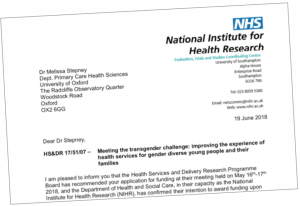 “I am pleased to inform you that the HSDRPB has recommended your application for funding… and the Department of Health and Social Care, in their capacity as the National Institute for Health Research (NIHR), has confirmed their intention to award funding…”
“I am pleased to inform you that the HSDRPB has recommended your application for funding… and the Department of Health and Social Care, in their capacity as the National Institute for Health Research (NIHR), has confirmed their intention to award funding…”
The Study Advisory Group – Bias? What bias?
“Several charities (including The Diversity Trust and Gendered Intelligence) are actively involved in the proposal. An online (Facebook or similar) group will engage transgender people throughout the project. The study Advisory Group will guide the research and comprise at least 50% transgender people.”
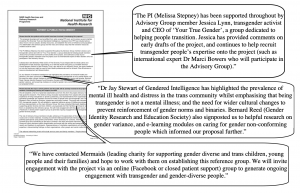
Jessica Lynn
If you’re not reeling yet, let’s look a little closer at the others who are involved in this wonderfully objective scientific project.

Pre and post-transition photos are shown in Lynn’s talk
A name that stands out on the document above is that of Jessica Lynn who has supported Stepney throughout the project.
Dr Marcie Bowers, the document tells us, was recruited to the advisory board of the project by Lynn. Bowers, also a transsexual, performed Lynn’s own surgery but is better know as the surgeon who performed a vaginoplasty, resulting in serious complications, on 18 year old reality TV star Jazz Jennings.
Lynn- not to be confused with the country & western singer songwriter of the same name – is a trans-identified American male who transitioned aged 45. Lynn is also good buddies with Sam Martin.
Jessica Christina Lynn was born in January 1965 with the birth name Jeffrey Alan Butterworth. Jessica is not well known on the transactivist scene. Outspoken about his past life, Lynn has recently embarked upon a ‘world tour’ ‘visiting 28 different countries, presenting over a thousand times, helping to educate the general public about the transgender community’.

Logos on Lynn’s webiste
Lynn’s website features the logos of several groups he is ‘affiliated’ with, including the NHS and University of Oxford, which seems at very least a bit cheeky – some might even suggest that Lynn is building the consulting business by using the Oxford and NHS logos on the website.
Evidently Jessica has ‘gained adulation for her activism’ and is a Stonewall school Role Model. Lynn’s website is indeed filled with adulation from students at Oxford, Stanford, Warwick and Yale, to name but a few. I was intrigued.
I watched a YouTube video of Lynn’s lecture at University College London (UCL) in 2018. You know when you’re at a family gathering or a party and you get cornered by a distant relative or a friend of a friend who insists on telling you every tiny detail of their life when you’d really rather be talking to someone else? That’s how watching that video left me feeling. I’m trying to be honest rather than unkind, I’m sure Lynn would find listening to me waffling on for an hour just as tedious.
Butterworth married in 1991 and fathered 3 sons. In 2010, age 45, he began his transition. In 2012 his wife filed a successful suit in Texas to remove his parental rights, claiming his transition was ‘harmful to the mental well being of their youngest son’. Lynn has clearly undergone some serious heartache and trauma in life and I have no intention of belittling that. But I felt uncomfortable by the showing of pictures of his young child and the revealing of personal information about the boy, which in itself might be considered a safeguarding concern by some.
What I did have trouble seeing was how the talk was in any way either educational or inspirational. Lynn claims that ’75-85% of trans females know by the time they’re 5 years old’, an entirely unsubstantiated statistic which he appears to have plucked out of the air. He also reports that it’s ‘quite common’ for young trans-identified boys to attempt to cut off their penis, as he asserts he did age seven.
Lynn discusses a sexual encounter where he claims a partner ‘fingered’ him and said, ‘I must turn you on, you’re soaking wet’. Earlier in the talk Lynn shared the fact that his GRS involved penile inversion, and this form of neo-vagina cannot self-lubricate, it seems reasonable to dismiss this as fantasy.
The talk is rife with ‘sex jokes’ which, yeah, ok, on some level why not, but it’s all a bit TMI: jokes about penis sizes (his used to be big, his lover’s was small and he came too quickly) leave me wondering what we’re supposed to be learning here. At one point he talks of being able to remove his false teeth and jokes:
“‘June 2013, I’m the perfect girlfriend, right, can’t get pregnant, removable teeth. What a whore.”
I had to rewind that bit several times to be sure that’s actually what he said. It was.
Call me a prude, but listening to a man telling a group of students that the ideal girlfriend is some sort of purchasable fuck-toy doesn’t fill me with adulation. It fills me with fucking rage.
In an online interview, Lynn says that students are ‘very curious about sexual questions’. Asked when he would tell a sexual partner he was transsexual, he replies:
“If I just wanna go sleep with a guy, y’know, and I’m on the road, I don’t tell them.”
In my humble opinion there seems to be quite a few issues here about Lynn’s suitability as consultant on a project concerning the welfare of young trans-identified people.
In February 2020 at University of Bath held a CPD (Continuing Professional Development) day for staff and students. Lynn spoke about ‘her lived experiences of being Transgender‘ and this was followed by a talk by Sam Martin who spoke about ‘experiences, information and support needs of trans and gender diverse youth‘.
Indeed, Jessica and Sam are such good mates they run a podcast series together.

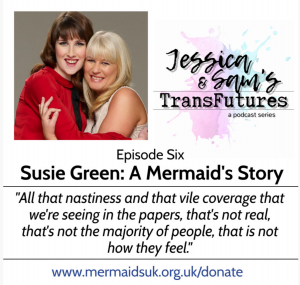
In episode six (May 2020) they discuss the importance of ‘the positive effects of young people accessing timely, gender related healthcare interventions’ with Susie Green of Mermaids.
“I don’t think people realise how important puberty suppressants are to young transgender children,” says Jessica (who, let’s remember, transitioned age 45 after fathering 3 children). “It can be life or death.”
“There are attacks continuing against… young people, particularly regarding their access to medication and their right to consent to it.” says Green, whose child began taking cross-sex hormones age thirteen.
When Susie reveals that her child had full ‘gender reassignment surgery’ in Thailand on his 16th birthday, there is excited laughter.
“She lived my dream, unbelievable! To be able to transition at that age. What a dream!” gushes Jessica, going on to add, “I’m so thrilled. I’m so thrilled that she has a mother like you. I wish more mothers were open and accepting… your daughter is living my dream life and now you’re doing this for the next generation of kids.”
“The work you’re doing is absolutely fantastic. It’s saving lives.” concludes Sam.
Jay Stewart

Jay Stewart
Another member of the advisory committee- and a co-applicant for the grant process- is Jay Stewart. One of Stewart’s roles as a co-applicant was to enlist participants through ‘recruitment and dissemination’.
Jay Stewart is a ‘transman’ (a female) who provides seminars in primary schools on behalf of GI, encouraging children to consider their ‘gender identity’. GI also organises summer camps for ‘trans kids’ and has previously received arts grants from pharmaceutical company Burroughs-Wellcome.
One might well ask how a little girl who likes ‘boy stuff’ feels when an important bearded ‘man’ comes into her school and tells her and her peers that he ‘used to be’ a woman and it’s possible to change sex?
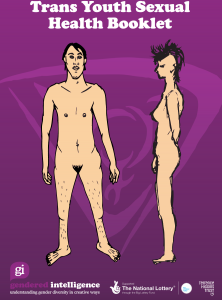 The Gendered Intelligence ‘Trans Youth Sexual Health’ booklet, by and for young people aged 16-25, partially sponsored by the National Lottery, tells young people:
The Gendered Intelligence ‘Trans Youth Sexual Health’ booklet, by and for young people aged 16-25, partially sponsored by the National Lottery, tells young people:
“A woman is still a woman even if she likes getting blow jobs. A man is still a man even if he likes getting penetrated vaginally.”
It adds, “Surgery will affect sex in many ways but the most noticeable effect is a boost in body confidence. You may enjoy sex more as you begin to feel better about expressing yourself.”
In addition to Gendered Intelligence, groups and individuals that appear to have been involved, or have been asked to be involved in recruiting participants are Mermaids (CEO Susie Green) and Dr Helen Webberley.
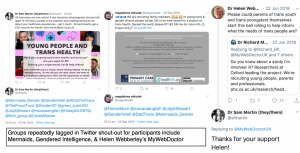
All of these organisations and individuals promote the affirmation model (ie if a girl says she’s really a boy, you should agree, yes, she is a boy) and all support the provision of puberty blockers and cross-sex hormones for trans-identifed young people. It seems pretty much impossible that bias could be ruled out using such recruitment methods.

blocked by Mermaids
A parent who does not believe in the ‘born in the wrong body’ narrative is more likely to be blocked by on social media by Mermaids than being encouraged to join a research project.
Mermaids
Mermaids is often referred to as an LGBTQ+ charity but its sphere is not LGB youth. The homepage of its website states that its aim is ‘helping gender-diverse kids, young people and their families’. (There’s that phrase again ‘gender diverse’).
As noted earlier, Green took her own gender diverse child to Thailand for full ‘gender reassignment surgery’ on his 16th birthday.
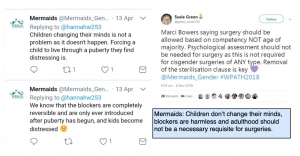 As these tweets (above) from Mermaids and Green show, they believe that children changing their minds about their gender identity ‘doesn’t happen‘, that blockers are ‘completely reversible’ and that surgeries should be performed on under-age children.
As these tweets (above) from Mermaids and Green show, they believe that children changing their minds about their gender identity ‘doesn’t happen‘, that blockers are ‘completely reversible’ and that surgeries should be performed on under-age children.
These are peculiar and easily refutable claims. My own child desisted, as do many others. Most feel a bit embarassed by the whole thing and don’t wish to talk about it. Recent media reports have highlighted the experiences of both Keira and Jacob, who have been brave enough to speak up and who believe they were given access to drugs too young and without due care.
“(Taking blockers) was the worst decision I’ve ever made… it was sold to me as a miracle cure for being trans.” Jacob (16)
“”I should have been challenged on the proposals or the claims that I was making for myself… I was allowed to run with this idea that I had, almost like a fantasy, as a teenager…. and it has affected me in the long run as an adult.” Keira (23)
Helen Webberley

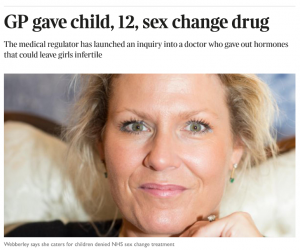 Helen Webberley is infamous for providing cross-sex hormones to a twelve year old child. She has a criminal conviction after being fined £12,000 in December 2018 for illegally providing healthcare services from her home. After her UK practice was shut down, she and her husband moved to Malaga, Spain where they continue their business.
Helen Webberley is infamous for providing cross-sex hormones to a twelve year old child. She has a criminal conviction after being fined £12,000 in December 2018 for illegally providing healthcare services from her home. After her UK practice was shut down, she and her husband moved to Malaga, Spain where they continue their business.
Sam Martin thanks Helen for her support for the project on twitter (see above).
What are the implications of this?
Are we really supposed to believe that this group of people are going to produce an impartial and objective study on the needs of trans-identified youth when it’s quite clear that they already have committed and passionate beliefs about what they believe is needed?
If everyone involved in recruiting young people for the project believes there should be less gatekeeping and easier access to hormones and surgery for young people, then that is going to be exactly what the researchers find is needed.
Participants
I spoke to a parent who had participated in, but felt critical of, the study. Catherine (a pseudonym) told me:
“They’re collecting participants from specific pools. I felt I wasn’t ‘on script’; I wasn’t saying what they’d heard from other parents… I don’t think what they’re doing is good science, that’s the problem here. They’re conducting a research piece with a view to furthering a trans agenda. It’s not science, it’s a political exercise and the purpose is not to find out information, it’s to reinforce an existing belief. That’s the fundamental issue with that study. It’s a bubble. They operate in a bubble. Getting outside of their bubble- well, I don’t know, they just bounce off the sides. It’s an echo chamber… Here’s my concern with the whole exercise: someone somewhere came up with the idea that we need research to back up the demand for faster, quicker- less gatekeeping- and shorter waiting times. It’s as if someone designed research purely around the idea that you need to do things quicker. It’s as if they want to do the wrong thing, faster. That’s my take on it… I do think some of the people who set up the study know what they’re doing, they know it’s institutional capture and that’s their objective. They’ve politically captured institutions, for example the Tavistock, and what they need is research to back them up now. I don’t think everyone involved is scheming, not at all: I think most of them just can’t see out of the bubble.”
The grant awarding body allegedly had other concerns, however. A long list of them. So many in fact that’s it’s virtually impossible to see how, in a climate where so many much-needed, well planned and structured projects are refused funding, this one managed to secure itself over six hundred grand.

Concerns? What concerns?
In fact, the list of concerns expressed by the awarding body- according to the documents I saw- was so extensive that it covered an entire two pages of the outcome letter and included the following:
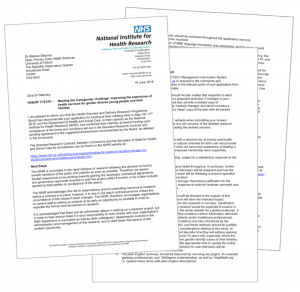 “The proposal was lacking in methodological detail throughout…
“The proposal was lacking in methodological detail throughout…
a detailed plan of analysis is required…
the reach of Healthtalk to the audiences for this research is not clear…
the team should consider how they would address any bias introduced by the recruitment methods used (social media etc)…
further detail is required regarding ethical considerations…
the team are asked to consider and describe how they will address gaining consent from the youngest participants…
the plain English summary should be improved by removing any jargon…
PPI costs should be reviewed throughout the application and any inconsistencies resolved…
costs and contributions for co-applicants and staff should be reviewed...
please clarify what third party rights exist in relation to background IP (intellectual property)…“
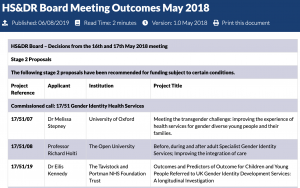
The list above is far from extensive. Now- sadly- I’m no expert in applying for over six hundred grand’s worth of funding but it does seem to me that perhaps at least some of these issues should have been properly resolved before the grant was promised?
What exactly is going on here?
The NIHR (grant awarding body) is primarily funded by the Department of Health and Social Care. The DHSC is, of course, funded by the taxpayer.
So, yeah, you’re paying for this charade.
Cheers!


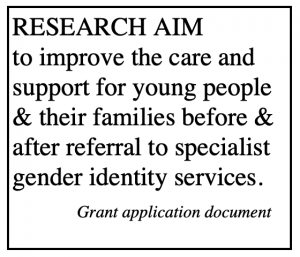
OMG , what a farce, and you can be certain that their findings and results from the research will tell them exactly what they want to hear, and then be broadcast widely.
It is very depressing, watching the institutional capture of this madness and the desperate damage it is causing . Thank you Lily for raising awareness.
Fantastic work Lily. Now this really needs to be disseminated widely. But it will be super useful when, as we know will happen, the TRAs trot out this “scientific” study in the future.
Excellent and frightening investigation, Lily.
Have you shown this to Janice Turner? This needs to reach a wider audience.
Brilliant digging!!
There must be a Freedom of Information request for more info in here somewhere. Money from the public purse? Publish all the research not just the report…
Or a letter to your local MP re Early Day motion on this funding?
The rest of us have to jump through so many hoops and still don’t get funding. This is so wrong.
They’re not waiting for a child with problems to present itself to a doctor first, but recruiting insecure children via social media – have I got that right? Also, it is not true that patients are never assessed psychologically before undergoing an operation. I have first-hand experience of it! Add that to the lie about puberty blockers not having irreversible effects, which the NHS now admits is misleading, and the lie about children not changing their minds. It is much harder for a child to come to terms with the sex of their body and admit they were misguided, when all those around them have been coerced into using new names and pronouns and reinforcing the ‘wrong body’ belief. They’re faced with a choice: the humiliation of a second ‘coming out’ followed by threats of rejection from the cultists, versus the lure of continuing on the ‘transition’ path. It doesn’t look as if any of that public money will end up actually helping anyone except those who profit from lifelong medicalisation of children.
I strongly suggest that you report your serious concerns about Mermaids and other charities to the Charity Commission. The complaint form is here: https://forms.charitycommission.gov.uk/raising-concerns/
You will need to ask the charity trustees first to resolve the issues (of course they never do). All charities must operate for the public benefit, and the Commission is especially concerned about any harm they might do to beneficiaries. You will need to be specific about the harms.
This is a spiteful piece of rubbish, this is no worthwhile ‘digging’ here at all. All funding applications come back with amendments, you clearly know nothing about science, considering you admit to not even understanding one of the researchers talks. Perhaps it would be wise to have educated yourself a little further first? The stuff you pick out is pathetic, why can’t trans people be involved as researchers and advisors on research about trans issues? All researchers have good doctorates, which means they’ve passed peer review in a number of formats, and have demonstrated their objectivity and skills in this area. One minute you argue some people in the team are too involved in the community, and the next you’re picking on the PI for not having experience in the area!? So the PI can’t be trusted, she hasn’t published on this before, but the trans researcher also can’t be trusted, they are too involved, oh and lets chuck the other under the bus too because we didn’t understand their talk once, and then what a surprise, two trans people happen to be on the project that know each other, wow, what a conspiracy! How much more impartial can you get actually, people from all walks of life? Plus the lived experience involved in this research means the team can be sensitive and understand it from all perspectives. Lets just be clear, it takes an awful lot of clearing to get a grant that big at a university like Oxford. There will be continuous regulation and observation of the work. This is appalling spreading of pure gossip on your part, which is irresponsible given many people won’t understand the process of academic research and will simply follow the rubbish you’re putting out. You have purposefully misgendered an individual who you even said yourself wishes to be referred to has they/them, which I think pretty much sums up how biased you are on this matter. I suggest you waste less time writing this kind of nonsense and actually do some research yourself. You’ve found nothing here of worth or value, it’s just incredibly ignorant of you.
Thank you for your feedback.
That you use the term “purposefully misgendered” allows me to ignore your contribution.
Pingback: The Great (ongoing) Puberty Blockers Experiment -Lily Maynard